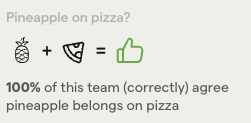I got an text from a friend[1] asking if I was still applying for jobs and pointing me to this job description. I was at a meetup with Community Pros of LA so I glanced at the job description and noticed it was a bit different. Then I got home and saw that it was really different. For instance, it includes a little graphic in the sidebar:

Reading deeper there are other things I noticed:
-
The company is default alive, which is to say, they have a path to profitability even they don’t get more investments.
-
They publish the employee handbook, which includes details of the hiring process.[2]
-
The role is brand new and not already defined. This is good because companies rarely understand what goes into a community management job. I’d rather work on discovering how (and where) PostHog’s community functions than trying to break preconceived ideas that aren’t quite right.[3]
-
The job description mentions social media, but leaves it up to the eventual hire to decide if they want to own it. At our meetup today, my fellow community professionals agreed it was a sign of a confused community strategy to lump “community” with “social media”. They are two very different things and it’s exceedingly rare to find someone who is equally comfortable in both roles. Having the option to use social media as a community tool is, of course, welcome. It’s just companies should consider a social media specialist if they want to use it in their strategy.
-
The job description mentions doing different things instead of staking the future on one big idea. I’m in favor of that since big concept projects usually means gathering low hanging fruit instead of making incremental progress. The solution to your problem is almost always going to be a complex basket of ideas.
-
According to the Community section of their handbook:
We want to build a self-sustaining and scalable community of engaged users because it will enable us to own our audience in a way that third party social media platforms do not. Like brand or content, building a thriving community is a (very) long term bet, so we will need to both invest a lot of time up front and then wait to see what works and what doesn’t.
It’s genuinely refreshing to see a company acknowledge upfront that community takes time.
-
The community platform is currently oriented around questions (interesting!) and might be attached directly to documentation (what a good idea).
As I browse through their site, I keep seeing new things that impress me. That’s before I even looked at the product itself. I’m tempted to stop writing this to install PostHog on one of my sites to see if I can query web analytics with SQL. Or would it make sense to test the survey feature to see if I can automate my outstanding task of creating 100+ surveys for a client.
That said, I don’t get the name. I gather it’s closer to “hedgehog” given the mascot than a pig raised for slaughter or a motorcycle brand. Maybe it has something to do with the fox and hedgehog parable? Does it refer to PostgreSQL somehow? If I’m fortunate enough to get an interview, that’ll be something for me to ask about.[4]
Actually a college friend who has hired me twice . . . and laid me off twice. Hi, Mike! ↩︎
I have no way of knowing if they will stick to their process. I’ve learned from experience that companies tend to take shortcuts if they aren’t hyper vigilant. Of course, I’ve never worked for a company that made their hire process public in this level of detail. ↩︎
And that includes my own preconceived analysis. It can be fun and profitable to be surprised by a community! ↩︎
Or be boring and just Google it. “The ‘Post’ in PostHog comes from the concept of ex post facto laws – laws that are applied retroactively. The parallel is by auto-capturing event data, we can help you draw meanings after your users are long gone.” The page has an unanswered question which suggests an edit. Maybe my question could be about why that question wasn’t addressed. ↩︎